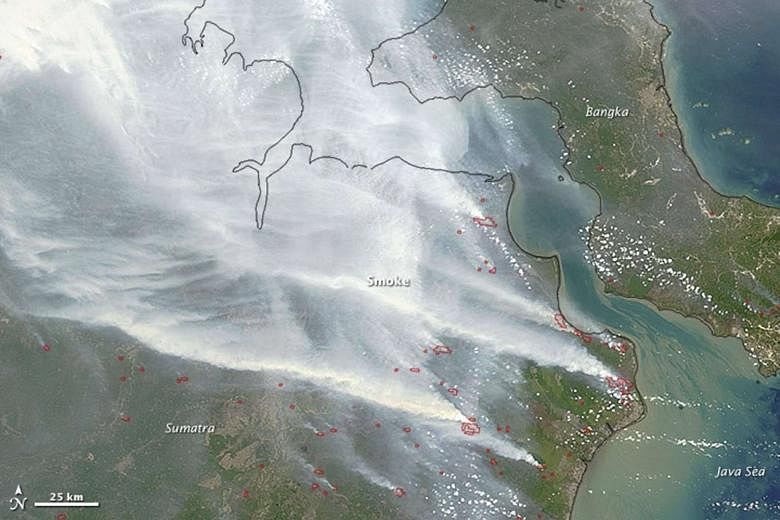JAKARTA (AFP) - Forest fires blanketing South-east Asia in choking haze are on track to become among the worst on record, scientists warn, with a prolonged dry season hampering efforts to curb the crisis.
Malaysia, Singapore and large expanses of Indonesia have suffered for weeks from acrid smoke billowing from fires on plantations and peatlands that are being illegally cleared by burning.
The crisis grips the region nearly every year during the dry season, flaring diplomatic tensions among the neighbours as flights are grounded, schools close and pollution levels reach hazardous highs.
But the current outbreak is one of the worst and longest-lasting in years, with an El Nino weather system making conditions drier than usual in Indonesia and keeping much-needed rain at bay.
Scientists at Nasa now warn this year's outbreak is on a trajectory similar to 1997 - widely regarded as the most serious haze event on record - and could exceed those unprecedented levels.
"Conditions in Singapore and south-eastern Sumatra are tracking close to 1997," Robert Field, a Columbia University scientist based at Nasa's Goddard Institute for Space Studies, was quoted as saying by the US science agency.
"If the forecasts for a longer dry season hold, this suggests 2015 will rank among the most severe events on record." Herry Purnomo, a haze expert at the Indonesia-based Centre for International Forestry Research, agreed the situation was akin to 1997, describing the magnitude of this year's fires as "horrendous".
"I believe the impact of the fires this year will be as bad as 1997, in terms of the cost," he told AFP.
Indonesia has deployed more than 20,000 troops, police and other personnel to Sumatra and Kalimantan to fight the fires through waterbombing and chemically-induced rainfall, and hopes rain will arrive within a month to finally douse the blazes.
Indonesia has faced pressure from its neighbours to address the problem since it first emerged nearly 20 years ago.
Authorities this year say tens of thousands of people across Singapore, Malaysia and Indonesia have been forced to seek medical treatment for respiratory problems.
The fires also contribute significantly to climate change. The Nasa-linked Global Fire Emissions Database has estimated around 600 million tonnes of greenhouse gases have been released as a result of this year's fires - roughly equivalent to Germany's entire annual output.


